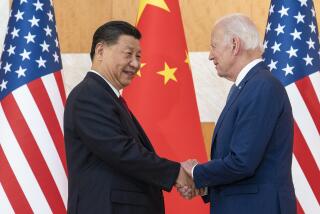Reagan Off for Far East Today; Terrorism, Economics in Spotlight
- Share via
WASHINGTON — President Reagan leaves today on the longest overseas trip of his presidency, a 12-day swing across the Pacific Basin that will culminate a week from now in a seven-nation summit meeting in Tokyo at which Libyan-backed terrorism appears likely to overshadow the economic issues on the formal agenda.
To ease the impact of jet lag and a 13-hour time change, Reagan will take a meandering road to the summit. He will pass through Los Angeles today, pause for a weekend at the beach in Honolulu and make a brief stopover on Guam before the first business visit of the trip, a meeting with the foreign ministers of the Assn. of Southeast Asian Nations in Bali, Indonesia, on May 1.
He arrives in Tokyo the next day in preparation for the May 4-6 summit.
Although the Tokyo agenda is packed with pressing economic issues--U.S. trade problems with Japan and the European Communities, international currency exchange and the Third World debt--the news at the 12th economic summit probably will be dominated by political issues, including Libyan terrorism and the erratic course of East-West relations.
Terrorism a Priority
“I think it’s fair to say that one of his priorities will be a discussion at the summit of international terrorism and cooperation with our allies,” Senate Majority Leader Bob Dole (R-Kan.) told reporters Thursday after meeting with the President.
“He wasn’t specific, but he did indicate it is going to be one of the priorities on his agenda,” Dole said. “We need to know precisely where our allies are.”
Accordingly, highly placed Administration officials have said at news briefings this week that Reagan is expected to press for allied cooperation in dealing with terrorism. He is also expected to urge summit partners--Britain, Canada, France, Italy, Japan and West Germany--to forge a united front on East-West issues before his proposed meeting with Soviet leader Mikhail S. Gorbachev later this year.
Trade Deficit Worries
In addition, Treasury Secretary James A. Baker III said Thursday, Reagan will again take up the longstanding U.S. effort to persuade Japan and West Germany to boost their economies and expand domestic consumption to help reduce the huge $150-billion American trade deficit.
Administration officials have said that they are pleased with Japan’s stated intentions to restructure its economy away from exports and toward consumption at home; in fact, there may well be more friction with other trading partners than with Japan.
As it has at other economic summits, the United States will press for a lofty statement calling for a lowering of trade barriers. Since last year’s Bonn summit, when U.S. efforts to that end were fruitless, the Administration has persuaded recalcitrant France to join a new round of trade talks scheduled to begin in September.
Reining in the Dollar
The Administration is encouraged by international efforts made since the agreement of economic ministers from five major industrial nations in New York last September to intervene in currency markets to bring down the value of the high-flying dollar. The industrial nations have effected a series of coordinated worldwide declines in interest rates designed to stimulate economic growth.
And Reagan, despite resistance from West Germany and Japan to fixed exchange rates, is seeking to explore the possibility of changing the international monetary system to stabilize currency fluctuations.
Briefing reporters this week, a senior Administration official, speaking on condition that he not be identified, said he would like to see other summit partners do “whatever they can, consistent with the gains we have made against inflation” to speed up growth.
During Reagan’s brief stopover in Bali, Indonesia, next week, he is scheduled to confer with Philippine Vice President Salvador Laurel, President Corazon Aquino’s running mate in the February election.
Reagan telephoned Aquino from Washington on Thursday, the White House said, to discuss the $150 million in additional military and economic aid that he has asked Congress to provide for her government. The President also expressed “his and Mrs. Reagan’s best wishes” to Aquino and the Philippine people, the White House said. It was his first conversation with Aquino since her “people’s power” revolt ousted former President Ferdinand E. Marcos on Feb. 25.
Times staff writers Eleanor Clift and Tom Redburn contributed to this story.
More to Read
Sign up for Essential California
The most important California stories and recommendations in your inbox every morning.
You may occasionally receive promotional content from the Los Angeles Times.










